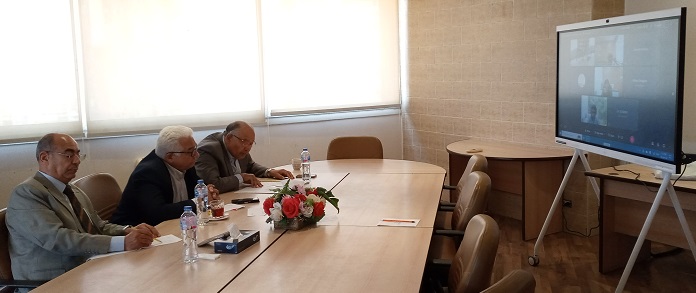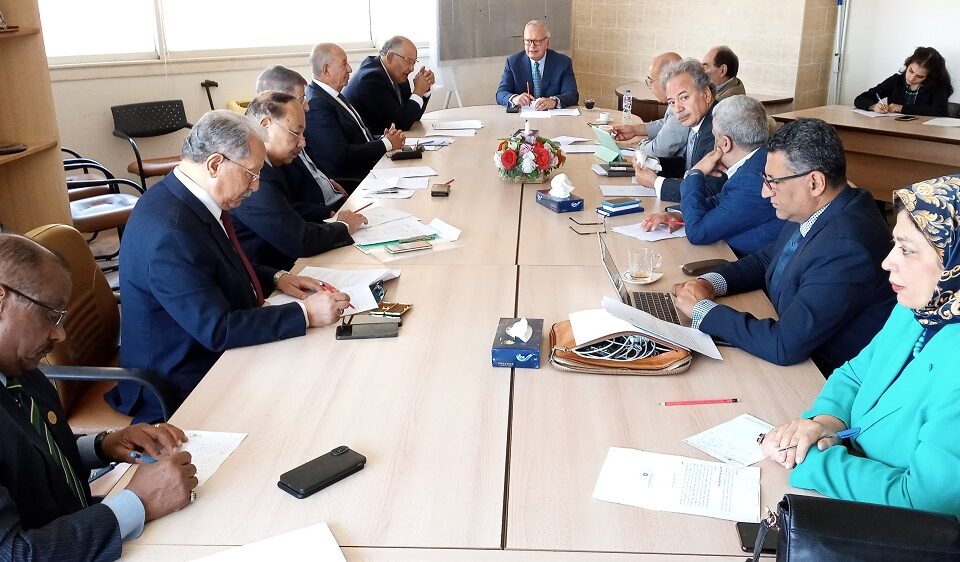Participation in Amman Security Forum
November 17, 2017The First Conference on “Prospects of Arabic-African-Chinese Relations within the Context of Belt and Road Initiative”
November 22, 2017
On the 19th of November 2017, a round table discussion was held at the Headquarters of the Egyptian Council for Foreign Affairs (ECFA). The Round table discussion was held within the context of ECFA’s keenness to closely follow the developments currently taking place in the region. The aim was to discuss repercussions of the resignation by Lebanese Prime Minister, Saad El-Hariri and the escalation between the Kingdom of Saudi Arabia (KSA) and Iran. The Seminar attracted the participation of H.E. Ambassador Abdur-Raouf El-Reedy, ECFA’s Honorary Chairman, Dr. Mounier Zahran, ECFA Chairman, Dr. Ezzat Saad, ECFA Executive Director, H.E. Ambassador Ehab Wahba, Coordinator of ECFA Permanent Committee for Arab Affairs, Dr. Mohammed Badre El-Deen Zayed, ECFA Member, Dr. Ussama El-Ghazaly Harb, ECFA Member, Prof. Dr. Ahmad Yousuf Ahmad, Professor of Political Science, and Dr. Muhammad Kamal, ECFA Member.
-
The Round Table discussion began with H.E. Ambassador Mounier Zahran, ECFA Chairman, stressing that organizing the discussion was part of H.E. Ambassador Ar-Reedy’s proposal that called for the need to keep abreast and discuss current developments in the regional arena. Holding this Round table coincided with the convening of an Emergency Meeting of Arab Foreign Ministers at the Arab League, called for by KSA to discuss Iran’s policies in the region.
-
E. Ambassador Ehab Wahba, H.E. Ambassador Ehab Wahba, Coordinator of ECFA Permenant Committee for Arab Affairs, affirmed that the meeting was a part of ECFA’s interest in discussing regional issues and the developments that the Arab world is witnessing. On the planned meeting of Arab Foreign Ministers, he stressed that divisions exist within the Arab ranks, in face of what is being echoed regarding the absence of Foreign Ministers of Qatar, Lebanon, Oman, the United Arab Emirates, Algeria and Iraq, with those States delegating only their representatives. He warned against following any disputed or unresolved steps, stressing that the Arab World has never gone through so many problems as it is doing right now. Even more, when a glimmer of hope to resolve those crises emerges, it is followed by the emergence of other obstructing crises as if they were parts of accurately calculated plans. For example, as the elimination of ISIL was almost at hand, the Qatari Crisis has emerged, with Four Arab States announcing their boycotting of the State of Qatar. It was followed by the Crisis of Kurdistan Region, then the recent crisis in Lebanon, and developments between KSA and Iran, in the wake of launching a Ballistic Missile from Yemen on Riyadh, and the announcement by KSA that the missile is Iranian made, followed by one of the US military officials, uttering support to the Saudi narrative. All of that, as it seems, is done with the aim of avoiding the Arab World from focusing on the development of its own conditions, but rather getting it preoccupied with solving its own problems and pushing it towards the normalizing of Arab-Israeli relations to confront Tehran. There are even talks that KSA is pushing Israel to launch a military operation against Hezbollah, a situation that reflects deterioration and disintegration of the Arab world from within.
-
During interventions by participants in the Round Table Discussion, ECFA Member, Dr. Osama El-Ghazaly, said that when looking at the Middle East and the Arab World, we will note that the greatest danger we are facing is Iran’s ambitions. Iran, since its revolution in 1979, has always shown its desire to extend its influence and hegemony in the Arab region, using its claims against Israel as a mere pretext for achieving that.
-
E. Ambassador Dr. Muhammad Badre El-Deen Zayed, ECF Member, stressed that Shiites are not all the same. They rather have many doctrines and sects. Hence, not every Shiite is Pro-Iranian nor is he a supporter of Iran . He emphasized the need to maintain the Arab Shiites’ opposition to Iran’s policies, casting doubt on the two scenarios that are anticipated after the return of Saad El-Hariry to Lebanon, which would be either to keep his resignation or annul it in exchange for concessions from Hezbollah.
-
Dr. Ahmad Yousuf Ahmad, a Political Science Professor, noted that what was happening in Lebanon then came within the context of the obvious Saudi-Iranian polarization and Iran’s quest to dominate the States of the region. He stressed the need to support Egypt’s current policy that is based on a rational idea of not interfering in Lebanon’s Internal Affairs.






